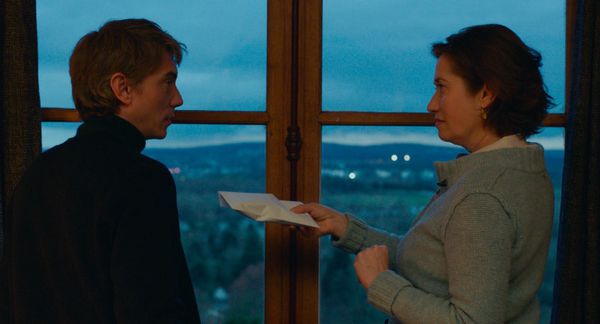Eye For Film >> Movies >> I Want to Talk About Duras (2021) Film Review
I Want to Talk About Duras
Reviewed by: Anne-Katrin Titze

In early December 1982, Yann Andréa, longtime lover of Marguerite Duras, decided to speak to Marie Claire journalist Michèle Manceaux about his relationship to the famous novelist and filmmaker who was 38 years his senior, mainly to gain more understanding about himself. He, a gay man, fell completely under her spell, at first for her writing, then for the person he wrote to for a year before she responded. He had met Duras at a post-screening Q&A of India Song and shyly approached her.
Swann Arlaud as Yann Andréa and Emmanuelle Devos as Michèle Manceaux give tremendous performances that circle around discoveries of deep personal truths in Claire Simon’s beautifully staged I Want to Talk About Duras (a highlight of the 59th New York Film Festival in the Currents programme). When they meet for the two audiotaped sessions one day apart, Duras, as an invisible presence, can be felt through the floorboards below, and, because she interrupts with instinctively strategically placed phone calls, offering coffee and impatience.

In a fascinating duel, more with himself than the woman across, Andréa reveals how he was lured in by Duras’s writing, started to drink Campari Bitter, and gave up his university studies. Overwhelmed to eventually be part of his heroine’s life, he left everything behind and moved in with her. “I’ll create you,” she said and when we lay eyes on him in Simon’s exquisite film, he is curled up on a couch by the window that opens up to a gray wintry landscape, vodka bottle on the table, cigarette lit, wearing a black leather vest. Duras didn’t like his friends, he says, and that he feels guilty all the time.
He expresses freely how much he needs her approval. His openness is staggering and it is easy for viewers to imagine the genders reversed as he talks of her control over what he wears, his perfume, the food they eat. Devos, who makes Manceaux a perceptive and imaginative listener, gets to insert poignant questions about submission and seduction that clarify and enhance his testimony. She gets a life of her own, when she returns past birch trees through the forest to her own house, still enthralled with what she and we just heard.
"I will remember you as the symbol of love's forgetfulness," Marguerite Duras wrote in the screenplay for Alain Resnais’s Hiroshima Mon Amour. Claire Simon’s film enters the mind of the listener and helps us remember.
Reviewed on: 31 Oct 2021















